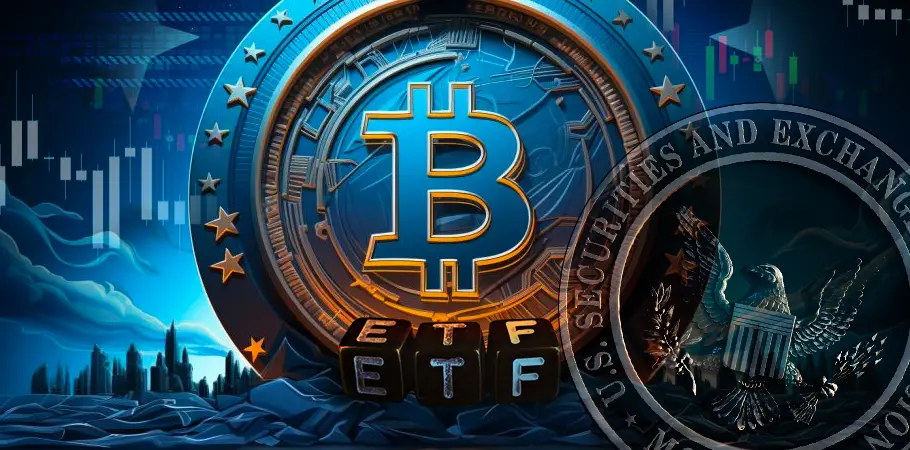Bitcoin ETF Set to Redirect User Interest Away from Centralized Exchange, Blockguard CEO Reveals

A recent development in the ever-changing world of cryptocurrency has caught the interest of both fans and investors alike. Anthony Bevan, CEO of Blockguard, a wealth management company, recently discussed a new trend. The rise of Bitcoin Exchange-Traded Funds (Bitcoin ETF) and their potential impact on centralized exchanges (CEXs) could reshape the crypto landscape. This insightful analysis is especially pertinent for Canadian readers navigating the volatile blockchain stock market.
The Shift Towards Regulated Investment Avenues
Bevan, a seasoned trader and investor, stated that the recent approval of a Bitcoin spot ETF by the SEC is expected to shift investor interest and trading volumes away from CEXs. This trend is driven by the growing demand for regulated and mainstream investment options. Investors, particularly newcomers to the crypto world, are increasingly drawn to the security and familiarity of regulated financial instruments, and a Bitcoin ETF fits the bill perfectly.
Decentralized ETF: A New Horizon in Wealth Management
This change is creating a challenge for CEXs. They have to raise the quality of their offerings to satisfy users who have recently had exposure to a Bitcoin spot ETF if they want to stay competitive. Bevan presents decentralized exchange-traded funds (ETFs), an intriguing idea. Unlike their centralized counterparts, these offer curated portfolios as part of an innovative portfolio management system, harnessing blockchain stock’s core attributes of decentralization and transparency.
Addressing Security Concerns in Decentralized Finance
Once security concerns are addressed, the discussion about decentralized finance companies is finished. Bevan acknowledges the rise in scam incidents and hacks in the DeFi industry. On the other hand, he argues that the mainstream media’s focus on these events is often overblown and discourages individuals from adopting decentralized finance. Despite these difficulties, Bevan is positive about DeFi’s potential and offers a number of risk reduction strategies, including the use of reliable platforms and strong account security procedures that are modeled after the DAO business model.
As the cryptocurrency market evolves, investors and enthusiasts can benefit greatly from Anthony Bevan’s insights. Due to their popularity and potential for regulation, Bitcoin ETFs are expected to bring about new market dynamics that will have an impact on centralized exchange roles and operations. Stay tuned for further exploration of this fascinating topic as we delve deeper into the implications of this shift in the next section of our article, including developments in gold backed token options and NFT stock.
Reshaping Investment Strategies in Crypto
The introduction of spot Bitcoin ETFs marks a watershed moment in the cryptocurrency world, heralding a shift towards more sophisticated investment mechanisms. This shift is influencing how investors approach Bitcoin and paving the way for the rise of decentralized ETF. These innovative financial products are reshaping investment strategies in the crypto sphere, potentially posing a significant challenge to traditional centralized exchanges (CEXs).
Curated Investment Portfolios in Decentralized ETFs
One of the standout features of decentralized ETF is their ability to provide investors with carefully curated portfolios. These portfolios consist of researched and back-tested coins, offering a more refined investment approach than the often overwhelming choice available on CEXs. The meticulous research and strategic planning behind each coin in these portfolios aim to mitigate any kind of risk associated with the volatile cryptocurrency market.
Decentralized ETFs raise the bar for efficiency and accessibility in cryptocurrency investing by utilizing the special powers of blockchain technology. With just one click, investors can now diversify their portfolios and engage in trading activities thanks to an extensive portfolio management system. This streamlined process contrasts sharply with the more cumbersome and often less transparent methods found on many centralized platforms.
Enhancing CEX Services in Response to Decentralized ETFs
With the introduction of decentralized exchange traded funds (ETFs), CEXs are under pressure to review and improve the services they provide. To stay competitive, these exchanges are now tasked with matching the high standards. They are set by decentralized ETFs in terms of investment options, including a range of securities, and user experience. Offering a larger selection of investment products, such as cutting-edge choices like NFT stocks and tokens backed by gold, enhancing customer service, and guaranteeing increased operational transparency could all be part of this.
Addressing Security Concerns in DeFi
The advent of ETFs represents a significant shift in investing strategies in the cryptocurrency space, specifically addressing the dynamic landscape of decentralized finance (DeFi). This trend puts pressure on established centralized exchanges (CEXs) to improve their services. Furthermore, it demands that investors adopt a more nuanced and security-conscious strategy. The increasing popularity of these creative investment vehicles emphasizes how important it is for investors to remain knowledgeable and flexible in a market that is changing quickly. It also emphasizes how critical it is to keep up with emerging trends and technologies in DeFi while still taking a strong security posture.
Centralization vs Decentralization: Insights from Anthony Bevan
Anthony Bevan, CEO of Blockguard, provides insightful commentary in the ongoing discussion about centralization vs decentralization in the cryptocurrency space. His views provide insight into how the world of cryptocurrency investing is changing, , with a particular focus on governance issues. Especially in light of the recent emergence of decentralized ETFs and how that has affected centralised exchanges (CEXs).
Centralized Exchange Under Pressure
According to Bevan, centralized exchanges are under a lot of pressure due to the acceptance and rising popularity of ETFs. Now that decentralized ETFs provide screened, backtested portfolios, CEXs are under pressure to improve the caliber of their services. To keep their user base, they should do things like improve the user experience, increase transparency, and provide more investment options. The introduction of Bitcoin spot ETFs has further intensified this competition, pushing CEXs to innovate and adapt.
The Allure of Decentralization
Bevan claims that a major draw of the cryptocurrency world is decentralization. He highlights that compared to traditional financial systems, decentralized finance companies provide users with an unparalleled degree of control and transparency. This aspect of DeFi not only attracts savvy investors but also appeals to those who value autonomy in their investment decisions, particularly when managing their assets. The growing interest in blockchain stock and NFT stocks further highlights this shift towards decentralized assets.
Security: A Double-Edged Sword
While decentralized platforms offer numerous advantages, they also come with heightened security risks. Bevan acknowledges the increasing instances of hacks and scam issues in the DeFi space. He contends, however, that the mainstream media frequently exaggerates these risks as a result of being swayed by the SEC warnings, which may discourage users from adopting decentralized finance. Bevan suggests using reliable platforms and strong portfolio management tools, including diversified funds, to help users reduce any kind of risk.
The Future of Crypto: A Blend of Both Worlds
According to Bevan’s predictions, a decentralized and centralized platform ecosystem will coexist and enhance one another in the near future. He thinks that centralized exchanges will change and grow, finding their niche in offering special services and planning strategies to meet particular investor needs within the DAO business model framework. While decentralized platforms – especially those offering cutting-edge products like gold-backed tokens – will continue to gain popularity.
To sum up, Bevan’s observations emphasize the complex interplay in the cryptocurrency space between centralization and decentralization. His point of view emphasizes how crucial it is to adjust to changing market conditions and how both centralized and decentralized platforms must constantly improve in order to better meet the varied demands of investors.












